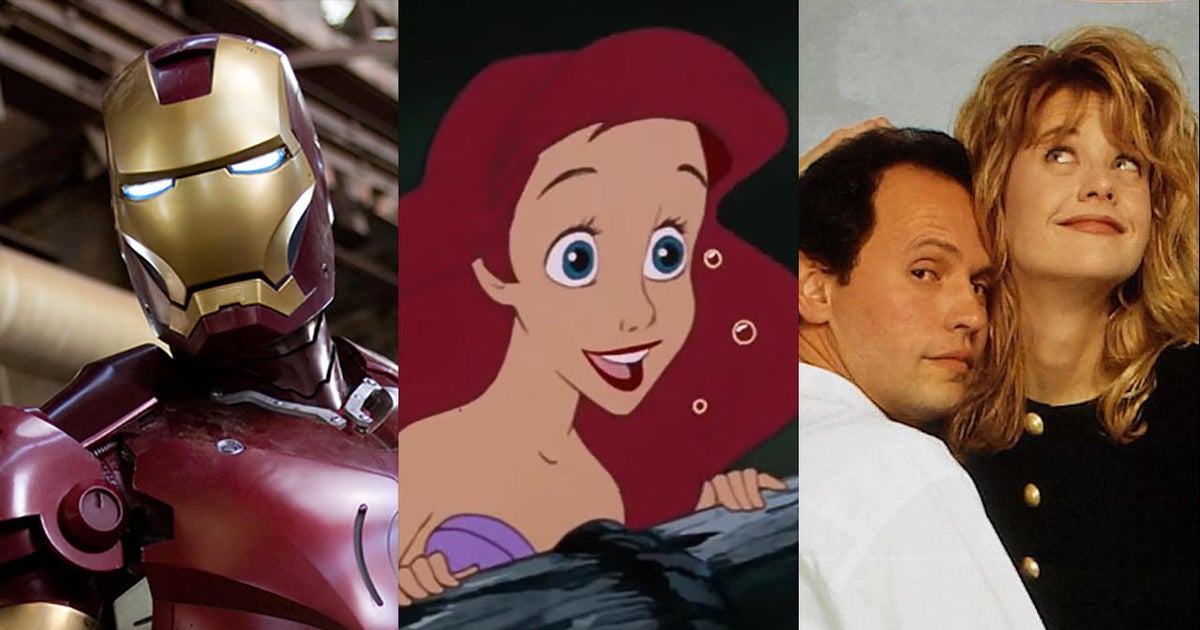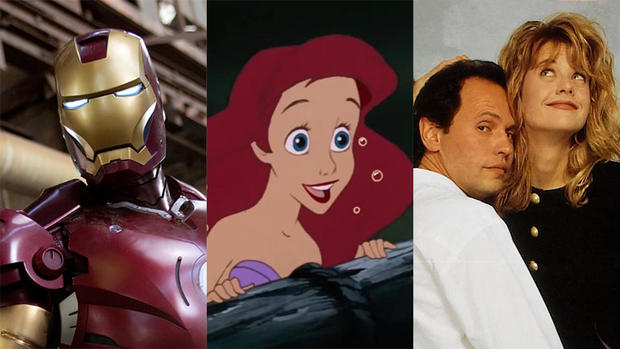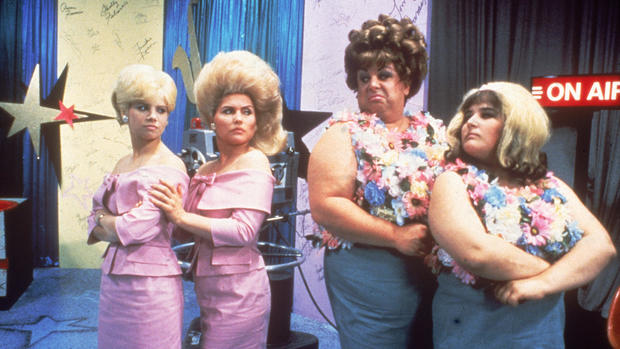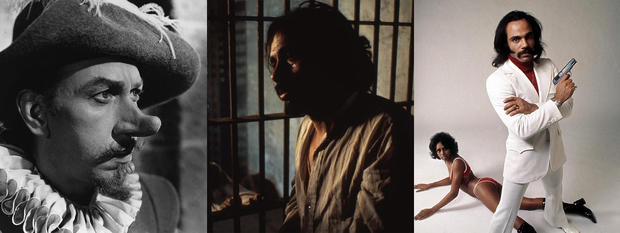National Film Registry: 25 movies including “Iron Man,” “The Little Mermaid,” “When Harry Met Sally” preserved by Library of Congress

The comic book adventure “Iron Man,” which helped spearhead the massively successful Marvel Cinematic Universe; “The Little Mermaid,” which launched a renaissance of Disney animated musicals; and the Billy Crystal-Meg Ryan romantic comedy “When Harry Met Sally,” whose fake sex scene offered a punchline for the ages, are among the films named today to the Library of Congress’ National Film Registry, aimed at preserving classic motion pictures for future generations.
Twenty-five films are being inducted into the Registry this year, the Library announced Wednesday.
The latest additions also include John Waters’ camp musical-comedy “Hairspray” (1988); “Carrie,” Brian De Palma’s 1976 adaptation of the Stephen King thriller, starring Sissy Spacek as a teenager gifted with telekinesis; and “Cyrano de Bergerac” (1950), for which José Ferrer became the first Hispanic actor to win a best actor Oscar.
Also: The Blaxploitation hit “Super Fly” (1972), starring Ron O’Neal; “Titicut Follies” (1976), Frederick Wiseman’s searing indictment of conditions inside a Massachusetts prison for the criminally insane; “Union Maids” (1976), about labor organizers in the 1930s; and Kenneth Anger’s seminal work of experimental cinema, “Scorpio Rising” (1963).
Each year since 1989, 25 films have been chosen by the Library of Congress for preservation, based on their cultural, historic and aesthetic importance to America’s film heritage. The Registry includes dramas, comedies, musicals, documentaries, animation, experimental and student films, and music videos, originating from Hollywood studios, independent producers and amateur filmmakers.
Marvel Studios/Walt Disney Pictures/Alamy
This year’s additions bring the total number of films in the Registry to 850. It also expands the recognition of diverse creators in cinema, with 15 titles added this year directed or co-directed by women, minority or LGBTQ+ filmmakers.
The oldest film to be added this year is newsreel footage from 1898 of the New Orleans Mardi Gras Carnival parade. The footage, long thought lost, was recently discovered in a museum in the Netherlands.
“Films have become absolutely central to American culture by helping tell our national story for more than 125 years,” said Librarian of Congress Carla Hayden. “We’re grateful to the entire film community for collaborating with the Library of Congress to ensure these films are preserved for the future.”
On Tuesday, December 27, at 8 p.m. ET, Turner Classic Movies will screen a selection of this year’s Registry additions. Select titles are also freely available online in the National Screening Room.
To submit nominations for films to be inducted in the Registry, click here.
Here is the complete list of this year’s additions:
Comedies
“Charade” (1963) — Cary Grant and Audrey Hepburn teamed up in this sparkling Hitchcockian thriller directed by Stanley Donen, in which a woman discovers her now-dead husband was not the man she thought he was — and now she’s being chased by a slew of sinister agents seeking a stolen fortune.
“Hairspray” (1988) — Baltimore’s own John Waters made his bones by directing ludicrously low-budgeted, deviant comedies (like “Pink Flamingos” and “Multiple Maniacs”) that brought bad taste to new heights. In the ’80s he began to have fun with his own reputation, with the camp soap opera “Polyester” (filmed in “Odorama”), and then “Hairspray,” a comedy about race relations and fat-shaming that was (most shockingly for a Waters film) rated PG!
New Line Cinema/Getty Images
Ricki Lake stars as Tracy Turnblad, a plus-size teen who becomes a star on a TV dance program, while protesting segregation forced upon Black dancers. The cast includes Waters regular Divine as Tracy’s mom, Edna, along with Jerry Stiller, Deborah Harry, Sonny Bono and Mink Stole. “Hairspray” would go on to inspire a Tony-winning musical — which would itself be filmed in 2007, with John Travolta filling the housedress of Edna Turnblad.
“House Party” (1990) — Kid and Play (of the hip-hop duo Kid ‘n Play) star in Reginald Hudlin’s raucous comedy about what happens when parents head out of town, leaving the house just ripe for an epic party.
“When Harry Met Sally” (1989) — Written by Nora Ephron and directed by Rob Reiner, this classic romantic comedy perfectly captured the chemistry of stars Billy Crystal and Meg Ryan as friends who discover, after many tribulations, that they are in fact meant for each other.
Horror/Science Fiction
“Carrie” (1976) — Stephen King’s first published novel, “Carrie,” was also the first film adaptation of the horror writer’s work — a visually-stunning tale of a teenage girl abused by her classmates who discovers the gift of telekinesis, which she employs to murderous effect. Director Brian De Palma’s flair for suspense was perhaps never better displayed than it was here, bolstered by Sissy Spacek’s mesmerizing, Oscar-nominated performance, and by fellow Oscar-nominee Piper Laurie as Carrie’s insanely devout mother.
Silver Screen Collection/Getty Images
“Iron Man” (2008) — The first entry in the Marvel Cinematic Universe, Jon Favreau’s splendid comic book adventure is the origin story of Tony Stark, a cynical armaments tycoon who rededicates his life by deploying his technical wizardry against a terrorist group and its enablers. Robert Downey Jr.’s performance as the wisecracking, conflicted genius who reshapes himself as a superhero in a flying suit is terrific, one that elevated the comic book genre and set the stage for a slew of “Avengers” features in which Stark stood front-and-center.
Musicals
“The Little Mermaid” (1989) — Composer Alan Menken and lyricist Howard Ashman had already teamed up on the stage musicals “God Bless You, Mr. Rosewater” and the Off-Broadway hit “Little Shop of Horrors,” when they were picked to concoct the music for Disney’s animated version of the Hans Christian Andersen tale about a mermaid who longs to be human — and sacrifices her stellar singing voice for legs. The film was an overwhelming critical and commercial success, and set the template for subsequent Disney animated musicals, including “Beauty and the Beast,” which was Menken and Ashman’s final collaboration before Ashman’s death, in 1991. Songs include “Part of Your World,” “Under the Sea.” and “Kiss the Girl.”
Dramas
Kurt Hutton/Hulton Archive/Getty; Rialto Pictures; Michael Ochs Archives/Getty
“The Ballad of Gregorio Cortez” (1982) — This story of a poor Tejano farmer who becomes a folk hero while being pursued by Texas Rangers after being falsely accused of murder was acclaimed for its innovative storytelling, and stands as a leading example of Chicano feature filmmaking. Directed by Robert M. Young. Shot in Super 16mm, the film was recently restored by the Academy Film Archive.
“Bush Mama” (1979) — Ethiopian-born director Haile Gerima’s UCLA thesis project tells the story of a young inner-city mother fighting the bureaucracies of the justice and welfare systems that seem programmed to lock her into a cycle of poverty. The film’s sense of realism is underscored by an early scene in which Black men are captured on camera being stopped and harassed by the police; the men were the film’s director and a crew member.
“Cyrano de Bergerac” (1950) — The first American film version of Edmond Rostand’s 1897 French play was acclaimed for José Ferrer’s performance, which earned him an Academy Award. Preserved at the UCLA Film & Television Archive.
“Pariah” (2011) — The award-winning debut of filmmaker Dee Rees (who later directed the Oscar-nominated “Mudbound”) tells the coming-of-age story of a Brooklyn high school girl who has not yet come out as a lesbian.
“Super Fly” (1972) — A Harlem drug pusher (Ron O’Neal) wants to leave the business, but not until making one last, big score. Directed by Gordon Parks Jr. (son of “Shaft” director Gordon Parks), with music by Curtis Mayfield, and also starring a Cadillac Eldorado whose owner, K.C., ended up in the film himself playing a pimp, a character as fly as his ride.
Documentaries
“Attica” (1974) — Cinda Firestone investigates the September 1971 uprising at New York’s Attica Correctional Facility, the deadliest prison riot in U.S. history.
“Betty Tells Her Story” (1972) — Liane Brandon’s landmark short film explores the meaning of storytelling and beauty in the tale of a dress, told twice. In the first take, Betty relates her quest for finding just the right dress; she then retells the story, and in her more personal telling the underlying issues of body image and self-worth become manifest.
Cab Calloway Home Movies (1948-1951) — From the collection of the legendary singer-bandleader-actor, the black-and-white and color 16mm footage documents his home life and his family’s travels around the world.
“Manzanar” (1971) — Robert Nakamura’s recollections of a childhood spent at a Japanese American internment camp in central California during World War II, and how the experiences shaped the rest of his life.
“Mardi Gras Carnival” (1898) — The earliest footage known to exist of New Orleans’ traditional Carnival parade was found among the collection of the Eye Filmmuseum in Amsterdam, and recently restored. [You can watch a clip here.]
“Mingus” (1968) — A portrait of composer and bassist Charles Mingus, with rare footage of the legendary jazz musician.
“Titicut Follies” (1967) — The first documentary by veteran filmmaker Frederick Wiseman was a characteristically dispassionate fly-on-the-wall view of life inside Bridgewater State Prison for the Criminally Insane in Massachusetts. The film played at festivals and had a limited release. But its depiction of the treatment of inmates would prove so searing that the state’s Supreme Court ordered the film banned, its negatives and prints destroyed. The ban — the first for reasons other than obscenity or national security — was later amended, restricting screenings until 1991. It was aired on PBS the following year.
“Union Maids” (1976) — Julia Reichert, Jim Klein and Miles Mogulescu directed this Oscar-nominated oral history of labor organizers from the 1930s, which documented the role of women participating in the male-dominated unions.
“Word is Out: Stories of Some of Our Lives” (1977) — A mosaic composed by queer filmmakers (the Mariposa Film Group) about the emerging gay rights movement of the 1970s, a groundbreaking record of the courage of men and women coming out.
Experimental/Shorts
“Behind Every Good Man” (1967) — A pre-Stonewall short by UCLA student Nikolai Ursin is a flirtatious early portrait of Black gender fluidity and the quest for love and acceptance.
“Itam Hakim, Hopiit” (1984) — Hopi Native oral traditions are translated into video by Victor Masayesva Jr., using stories told by elder Hopi historian Ross Macaya, who died soon after the film’s release.
“Scorpio Rising” (1963) — Kenneth Anger’s experimental work is a collage of images of leather-clad bikers, cueing themes of violence, sadism and Nazism to a classic rock ‘n’ roll soundtrack.
“Tongues Untied” (1989) — Marlon Riggs’ video essay is a meditation on the Black queer experience, blending poetry and rap with personal testimonies. It stirred protests when it was aired on the PBS series “POV” (a third of public stations refused to run it); fueled criticism of the National Endowment for the Arts (which had partially funded the film); and became fodder for attack ads by conservative politicians during the 1992 presidential campaign. The film is preserved at the Berkeley Art Museum/Pacific Film Archive.
Films selected for the 2022 National Film Registry (in chronological order):
- “Mardi Gras Carnival” (1898)
- Cab Calloway Home Movies (1948-1951)
- “Cyrano de Bergerac” (1950)
- “Charade” (1963)
- “Scorpio Rising” (1963)
- “Behind Every Good Man” (1967)
- “Titicut Follies” (1967)
- “Mingus” (1968)
- “Manzanar” (1971)
- “Betty Tells Her Story” (1972)
- “Super Fly” (1972)
- “Attica” (1974)
- “Carrie” (1976)
- “Union Maids” (1976)
- “Word is Out: Stories of Our Lives” (1977)
- “Bush Mama” (1979)
- “The Ballad of Gregorio Cortez” (1982)
- “Itam Hakim, Hopiit” (1984)
- “Hairspray” (1988)
- “The Little Mermaid” (1989)
- “Tongues Untied” (1989)
- “When Harry Met Sally” (1989)
- “House Party” (1990)
- “Iron Man” (2008)
- “Pariah” (2011)
https://www.cbsnews.com/news/national-film-registry-2022-iron-man-the-little-mermaid-when-harry-met-sally/ National Film Registry: 25 movies including “Iron Man,” “The Little Mermaid,” “When Harry Met Sally” preserved by Library of Congress






